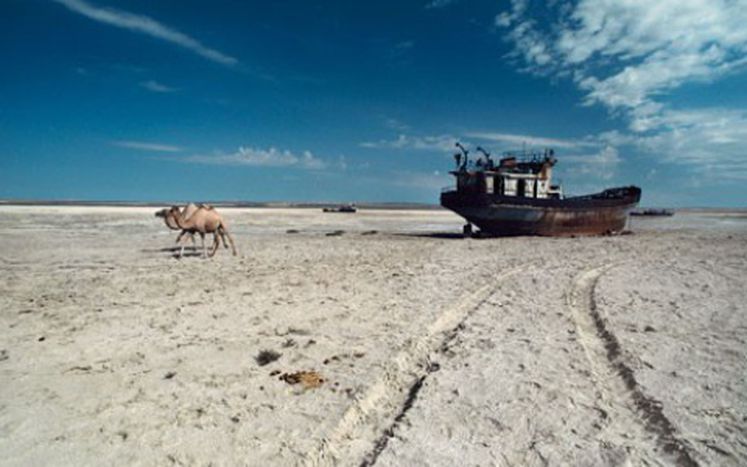
Uzbekistan: How much is cheap cotton worth to us?
Published on
Translation by:
Chris HeazlewoodTextile scandals keep coming. Just recently a British woman discovered a call for help from a sewer in a dress from the discount brand Primark. Five euro T-shirts can also be found in many places in Austria. However behind these cheap clothes often lie abysmal and environmentally destructiive working conditions. What is the situation in Uzbekistan, one of the largest cotton suppliers world-wide?
At least 2000 litres of water are necessary for the production of only one cotton shirt. Since rain causes the cotton to spoil the crop tends to be cultivated in dry areas, which raises a problem: irrigation. Uzbekistan is one of the major cotton suppliers on the globe. The cost of this has been the almost complete silting up of the Aral Sea, previously a huge, biodiverse inland sea in Uzbekistan and Kazakhstan.
Environmental Disaster on the Aral Sea
Since the era of Stalin, water has been taken from the Kazakh and Uzbek tributaries of the Aral Sea for the irrigation of cotton fields. From the 1960's the water level has been falling and the water volume of the Aral Sea has decreased by 90 percent. The Aral Sea, that in sources from the 19th Century is described as "a wonder of the Orient" and that was home to the most diverse animal species and sustainable fishing, silted up in the last 50 years. The sea was split into two sections. The salt content of the Aral Sea rose and is today 2.4 times higher than in the ocean. Most of the fish species died out.
The former port towns of Aral and Mujnak, which attracted tourists and thanks to the fishing were considered wealthy, today lie 30 and 80 kilometers respectively from the shore and feel like ghost towns. Since fishing no longer provides jobs, young people leave to make money elsewhere. Only children and old people live in the towns which now lie in the desert. Where in former times there were ports, today shipwrecks stand in a desert of sand and salt.
Agent Orange was used by the USSR to defoliate the cotton crops and it was simply sprayed over the cotton pickers. Agent Orange is a highly poisonous chemical which became known through its use by the US army in the Vietnam war. It causes a multitude of illnesses and is very persistent, that is it remains in the environment for a long time. Agent Orange also entered the streams flowing into the Aral and is now found along with many other pesticides and fertilizers in the desert around the sea, which is therefore extremely hazardous to health. Not only has the infant mortality rate in the Aral Basin risen, but also cancer and immune deficiencies are more common than in the rest of central Asia.
There have been no attempts to save the Aral Sea from the Uzbek side. Cotton is still the highest priority in the country! In Kazakhstan there has been an attempt to save that part of the lake which is located in their territory, which however has led to the Uzbek part of the lake drying out more quickly, resulting in conflicts between the two countries.
Uzbekistan has been independent of Moscow for more than two decades. For nearly just as long President Islam Karimow has ruled the country with a heavy hand. Dusty Uzbekistan lives on exports of natural gas and cotton. In 1919 Lenin ordered that cotton from Central Asia must meet the entire demand for cotton in the Soviet Union. The cotton pickers in the USSR suffered due to toxic fertilizers and horrendous working conditions.
No More Children in the Cotton Fields
After independence the cotton plantations were privatized but the whole harvest is bought by the state at a low price and cannot be sold to anyone else. The prices are so low that the farmers cannot afford to employ regular workers on their compulsorily acquired crops. And here the state intervenes: to keep the top position among cotton exporters 2 million children from the age of nine have been forced into work in the fields annually since independence.
It's dangerous to talk about it in Uzbekistan. Activists who campaign against forced labour on the cotton fields have reported that they were arrested and tortured. Nevertheless their efforts seemed to bear fruit in 2012 when there were no more children in Uzbek cotton fields. In spite of this the cotton continues to be picked and exported at the same price. By whom? In recent summers civil servants were used to maintain the same earnings from cotton. Teachers, doctors, nurses or postal workers, anybody in the public service, can be deployed and earn a few cents a kilo for spending several weeks in the cotton fields in the summer.
The consequence for those who refuse is at least the loss of their post. The hours are long and the pickers have to pay for food and transport to the fields themselves. In the fields the conscripted workers are sprayed with poisonous fertilizers and the accommodation is cramped and cold and damp. More than a few return home sick from their summer deployment. During their absence there aren't enough doctors and nurses and many hospitals are simply closed.
Information about the slavery and environmental pollution which has seeped through to the public has led to an official boycott by several large dealers for example: H&M, Adidas and C&A. However the practical consequences resulting from this have been few. The supply chains in the textile industry are long and rarely can they be traced back to their beginning.
Translated from Usbekistan: Was ist uns billige Baumwolle wert?



